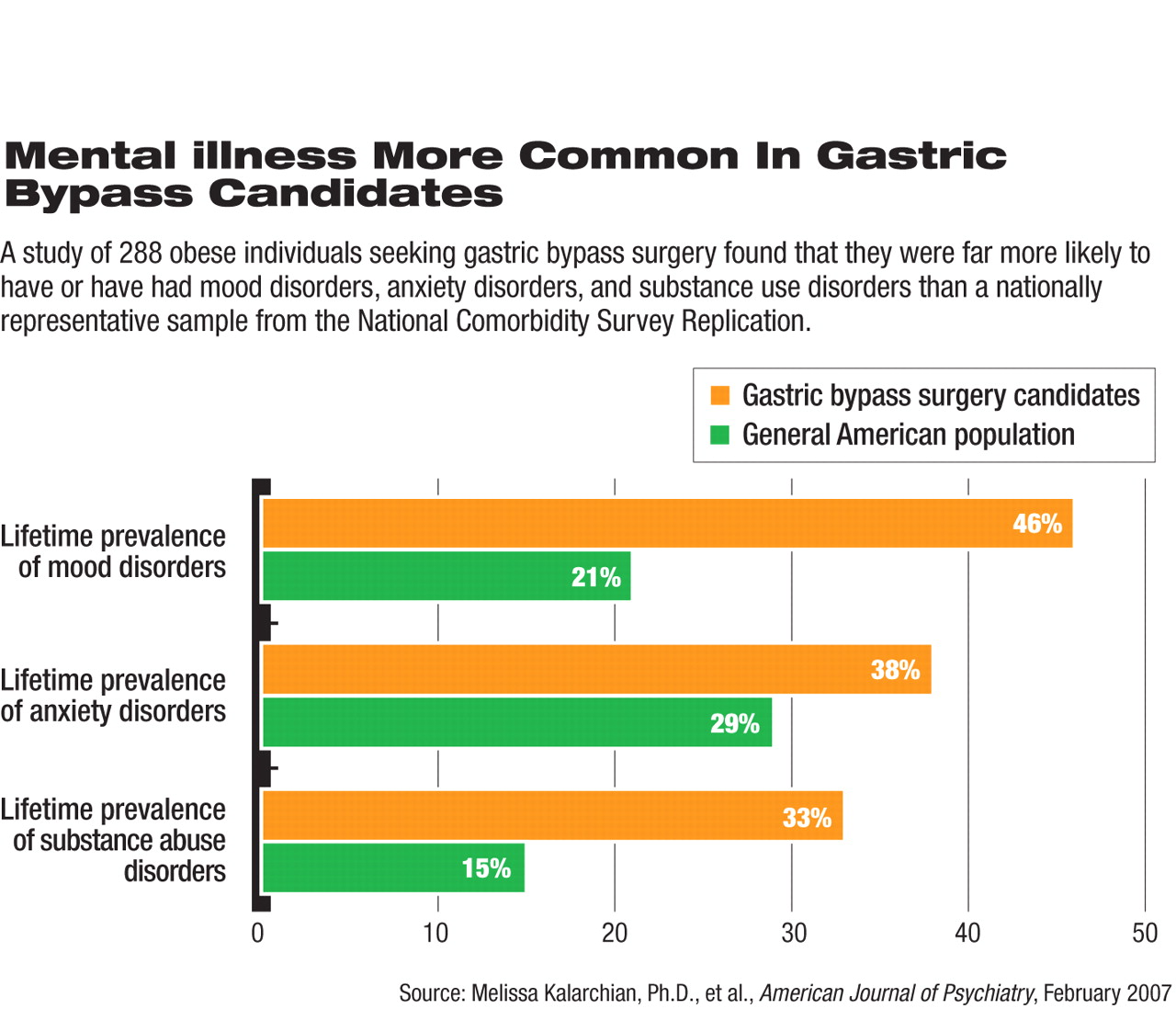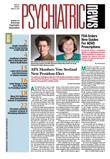As Americans grow heavier, their demand for gastric bypass surgery is growing as well (Psychiatric News, September 16, 2005). And the increasing demand for such surgery is attracting interest in the psychiatric realm.
Last year, for example, Duke University psychiatrists and internists reported on the case of a man who became acutely psychotic a few weeks after undergoing gastric bypass surgery. The psychosis was presumably due to rapid weight loss because he recovered completely without the need for antipsychotic medications. Psychotic manifestations after gastric bypass surgery have been reported by some other medical-specialty groups as well.

Now the prevalence of psychiatric disorders among obese individuals who seek gastric bypass surgery has been studied by researchers at the University of Pittsburgh's Western Psychiatric Institute and Clinic. The investigators reported their results in the February
American Journal of Psychiatry. Psychiatric illnesses—especially anxiety disorders—appear to be widespread among such gastric surgery candidates.
Melissa Kalarchian, Ph.D., an assistant professor of psychiatry and psychology at the Western Psychiatric Institute and Clinic, and her colleagues evaluated 288 obese individuals seeking gastric bypass surgery for both lifetime and current
DSM-IV psychiatric diagnoses. Two-thirds of the subjects had had at least one Axis I psychiatric disorder during their lifetimes, and their lifetime prevalence of Axis I disorders tended to be higher than among the general American population (see
chart).
Moreover, at the time of preoperative evaluation, more than a third of the subjects were found to have an Axis I psychiatric disorder; most were anxiety disorders. In fact, subjects were more likely to have an anxiety disorder than a mood, substance abuse, or eating disorder. Also at this point, more than a fourth of subjects were found to have an Axis II psychiatric disorder. Most common were cluster C personality disorders characterized by avoidant or obsessive-compulsive behavior.
Further analyses revealed that subjects who had had Axis I disorders at some point in their lives had significantly greater body mass indexes than those who did not have such a history, and that subjects currently with Axis I disorders had significantly greater body mass indexes than those currently without such a disorder.
Kalarchian and her team wrote in their study report that, collectively, these results are “compelling evidence that psychiatric disorders are a major concern for this patient population, not only because they are relatively common, but also because they are associated with severity of obesity...even within a group of extremely overweight individuals.”
Why psychiatric illnesses are so common among gastric bypass candidates is not clear, the researchers noted. Nonetheless, they offered several possible explanations. “Psychiatric disorders like major depressive disorder and binge-eating disorder may contribute to the development of severe obesity....However, psychiatric disorders may also be a consequence of severe obesity in a culture that stigmatizes...obesity.”
Finally, Kalarchian and her coworkers believe that their results shed some light on the biology of obesity. Specifically, one-third of subjects had a history of substance abuse or dependence, yet only 2 percent had such problems at the time of evaluation.
Thus, “it is intriguing to speculate,” they wrote, “that substance and weight problems may...have a shared diathesis, and that substance abuse remits when eating behavior predominates. Drugs and food may activate common reward circuitry in the brain.”
The study was funded by the University of Pittsburgh Obesity and Nutrition Research Center and the National Institute of Diabetes, Digestive, and Kidney Diseases.
 Now the prevalence of psychiatric disorders among obese individuals who seek gastric bypass surgery has been studied by researchers at the University of Pittsburgh's Western Psychiatric Institute and Clinic. The investigators reported their results in the February American Journal of Psychiatry. Psychiatric illnesses—especially anxiety disorders—appear to be widespread among such gastric surgery candidates.
Now the prevalence of psychiatric disorders among obese individuals who seek gastric bypass surgery has been studied by researchers at the University of Pittsburgh's Western Psychiatric Institute and Clinic. The investigators reported their results in the February American Journal of Psychiatry. Psychiatric illnesses—especially anxiety disorders—appear to be widespread among such gastric surgery candidates.